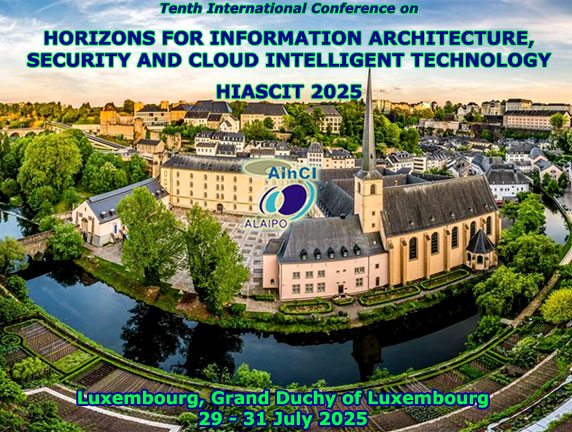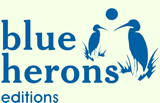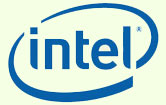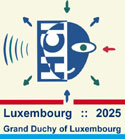Tenth International Conference on
Horizons for Information Architecture, Security and Cloud Intelligent Technology
( HIASCIT 2025 )
:: Luxembourg, Grand Duchy of Luxembourg ::
July 29 – 31, 2025
| Home |
| Topics |
| Important Dates |
| Paper Submission |
| Organization |
| Program |
| Registration |
| Publications |
::. BBK .::
Birkbeck University of London
UK
::. BOISE .::
Boise State University
USA
::. CNR - IMM .::
National Research Council
Italy
::. FUN .::
Future University Hakodate
Japan
::. HAN .::
HAN University of Applied Sciences
the Netherlands
::. IIMROHTAK .::
Indian Institute of Management Rohtak
India
::. ITB .::
Institute of Technology Bandung
Indonesia
::. KETTERING .::
Kettering University
USA
::. KNU .::
Kainan University
Taiwan
::. LEEDS .::
University of Leeds
UK
::. MCU .::
Ming Chuan University
Taiwan
::. METU .::
Middle East Technical University
Turkey
::. MJU .::
Myongji University
South Korea
::. MSU .::
Moscow State University
Russia
::. NHU .::
Nanhua University
Taiwan
::. NUU .::
National United University
Taiwan
::. POLSL .::
Politechnika Slaska University
Poland
::. PURDUE .::
Purdue University
USA
::. QUT .::
Queensland University of Technology
Australia
::. SHEFFIELD .::
University of Sheffield
UK
::. TSINGHUA .::
Tsinghua University
China
::. U-AIZU .::
University of Aizu
Japan
::. UB .::
"Vasile Alecsandri" University of Bacău
Romania
::. UBA .::
Universidad de Buenos Aires
Argentina
::. UC .::
University of Cincinnati
USA
::. UCC .::
University College Cork
Ireland
::. UCR .::
Universidad de Costa Rica
Costa Rica
::. UCM .::
Universidad Complutense
Spain
::. UGR .::
Universidad de Granada
Spain
::. UHK .::
University of Hong Kong
China
::. UIOWA .::
University of Iowa
USA
::. UM .::
University of Malta
Malta
::. UMD .::
University of Michigan-Dearborn
USA
::. UNC .::
Universidad Nacional de Córdoba
Argentina
::. UNED .::
Universidad Nacional de Educación a Distancia
Spain
::. UNIBO .::
Università di Bologna
Italy
::. UNIGE .::
Università degli Studi di Genova
Italy
::. UNILJ .::
University of Ljubljana
Slovenia
::. UNIMIB .::
University of Milano–Bicocca
Italy
::. UNJU .::
Universidad Nacional de Jujuy
Argentina
::. UNIST .::
University of Split
Croatia
::. UNIVE .::
Università Ca' Foscari Venezia
Italy
::. UNTREF .::
Universidad Nacional 3 de Febrero
Argentina
::. UofO .::
University of Ottawa
Canada
::. UOI .::
University of Ioannina
Greece
::. UPR .::
Universidad de Puerto Rico
Puerto Rico
::. US .::
Universidad de Sevilla
Spain
::. USC .::
University of Southern California
USA
::. UWI .::
University of the West Indies
Jamaica
::. VMMI .::
Virtual Maastricht McLuhan Institute
the Netherlands
::. VUA .::
Vrije Universiteit Amsterdam
the Netherlands
::. WASEDA .::
Waseda University
Japan
::. WSU .::
Wayne State University
USA
HOME |
|
The new virtual communities which will be born from these clouds will see the integration and confederation of the diverse models of networks that have existed: intranet, extranet, internet, and so on, with the novel micro computing and multimedia mobile phone devices. Here are some of the main goals, which we intend to discuss in this 10th International Conference on "Horizons for Information Architecture, Security and Cloud Intelligent Technology (HIASCIT 2025): Programming, Software Quality, Online Communities, Cyber Behaviour and Business." This synergy of people and tasks will generate new jobs across the whole planet, thus bolstering the notion of the expansion of communicability among the potential users. However, it is necessary to establish balances and controls in the behavior patterns of certain users, who with mercantilist purposes try to get the utmost personal profit with the least effort. It is also necessary to analyze in a neutral way the advantages and disadvantages of the concentration of digital information. Therefore, the quality metrics stemming from software engineering and other disciplines of the social sciences may constitute a set of attributes and quantitative rules in the online and off-line communication processes which must be respected by everybody. Many conferences are focused on specific aspects of computer science, telecommunications, virtual reality, mixed reality, architecture visualization, gamification, interactive technology for children, embodied interaction, conversational agents, artificial intelligence in education, etc., and bring together leading experts in a particular field or sometimes on a specific technology. At such large conferences students are often marginalized or relegated to poster sessions, for example, with 5 – 10 minutes for the presentation. Our conferences, workshops, symposiums, and so on, are not a "mega big" (thousands) scale and aim to promote dialogue between established professors and graduate students working on new directions. Besides, we are working under the modality "zero" Gardunia Factor. Hence topics from the whole range of software engineering, information architecture, digital security, hardware protection mechanisms, interactive design, communicability, expanded reality, user security training, and so forth are welcomed. Last year’s symposiums, workshops, conferences, etc., organized by ALAIPO and AInCI, for instance, included papers, demos, posters, work-in-progress, etc., on the topics (see below the alphabetical order). An extensive listing connotes and reflects the requirement and also skill necessary to find intersection zones of the disciplines among the different domains, fields, and specialties; which at the same time potentially boosts and merges the formerly different scientific views. In other words, the current international conference is aimed at all the professionals, experts, students, professors, researchers, businessmen, etc. hailing from the formal sciences, natural and the factual sciences. This is another of the reasons why, when we refer currently to the architecture of information, it is claimed that it is “an art and a science” to find the best possible solutions to the problems posed, from the programming of efficient and intelligent applications down to the management of the online communities. In this sense, cloud computing can increase the business in each one of the environments of the human being, going from intelligent mobile phone, federated database system, business intelligence, and so on., to theory and applications of cryptology, intrusion detection, methods and techniques for stopping attacks in social networking, just to mention a few examples. In short, we focus on the following main and secondary subjects, which do not exclude others of great current or future interest, alphabetically listed in the following way: :: Information Architecture - Cloud Computing for Service Oriented Architectures :: Security - Administration Security Policy :: Cloud Intelligent - Cloud Computing for Big Data :: Technology - Advanced Multi-modal Interfaces for Security :: Programming - Cloud Programming Models and Paradigms :: Software Quality - Attack Information: Analysis for Detection and Prevention :: Online Communities - Access to Online Information: Rights and Obligations :: Cyber Behaviour - Illegal Algorithms for the Censorship and Reputation Destruction :: Business - Business and Security Risk Models All contributions –papers, workshops, demos, posters, research-in-progress and doctoral consortium, should be of high quality, originality, clarity, and significance. Besides, all submitted papers will be reviewed by a double-blind (at least three reviewers), non-blind, and participative peer review. These three kinds of review will support the selection process of those that will be accepted for their presentation at the international conference. Authors of accepted papers who registered in the conference can have access to the evaluations and possible feedback provided by the reviewers who recommended the acceptance of their research works, so they can accordingly improve the final version of their contributions. This is an international conference “100% in-person.” Best regards, Francisco V. Cipolla Ficarra (Chair - coordinator) ALAIPO: Asociación Latina Interacción Persona-Ordenador –Latin Association of HCI (www.alaipo.com) and AINCI: Asociación Internacional de la Comunicación Interactiva –International Association of Interactive Communication (www.ainci.com). Address: Via Tabajani 1, S. 15 (7) - 24121 (Bergamo) Italy :: c/ Angel Baixeras, 5 - AP 1638 - 08080 (Barcelona), Spain. Email: info@alaipo.com :: info@ainci.com P.S. If you wish to be removed from this mailing list, please send an email to info@ainci.com or info@alaipo.com with "remove" in the subject line. Thanks.
2. The events have the following deadlines :: Deadline: 06.30.2025 – 23:59 local time in Hawaiian Islands :: Closed.
3. Program Committee: :: Francisco V. Cipolla Ficarra (chair - coordinator) Demo Session, Poster Session, Workshop Session, and Doctoral Consortium: :: Anna Parodi. University of Genoa (Italy), Amanda Rivera (University of Puerto Rico), Miguel C. Ficarra. AInCI, ALAIPO and FMF. Honorary Committee: :: Jaap van Till. Delft University and HAN Polytechnic (the Netherlands) Scientific, Steering and Technical Committees: :: Alan Radley. Perspective Research Centre and University College London (UK)
|
|
| © 1997 - 2025 AINCI & HCI Lab | ||||
|---|---|---|---|---|































